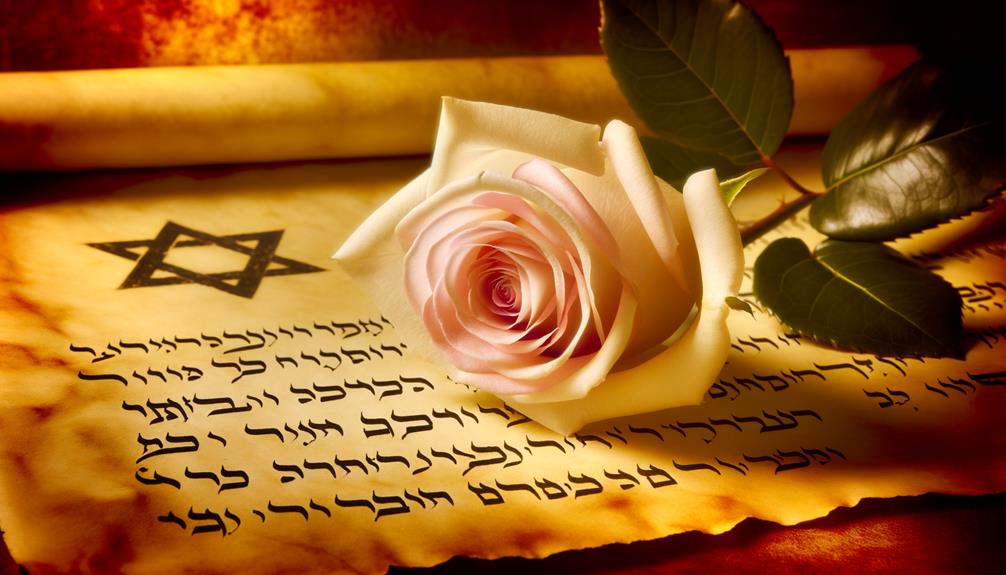Meaning of the Name Rose in Hebrew
In Hebrew, the name 'Rose' translates to 'Shoshana,' symbolizing beauty, purity, and divine connection. Rooted in ancient texts, 'Shoshana' reflects natural elegance and spiritual depth.
It appears in the Bible, prominently in the Song of Solomon and Isaiah, embodying themes of love, renewal, and hope. The rose's thorns signify life's challenges in the pursuit of perfection, while its bloom signifies spiritual awakening.
This name integrates profound cultural, religious, and symbolic layers, connecting individuals to their heritage. Continue exploring to appreciate its enduring cultural impact and legacy.

Key Takeaways
- In Hebrew, 'Shoshana' translates to 'lily' or 'rose,' symbolizing beauty and purity.
- The name 'Rose' in Hebrew embodies divine love, beauty, and spiritual enlightenment.
- Biblical references use the rose to signify hope, renewal, and divine love.
- 'Shoshana' reflects ancient symbolism of natural beauty and moral purity.
- The rose symbolizes innocence, holiness, and a connection to the divine in Hebrew culture.
Hebrew Origins of Shoshana
In Hebrew, the name 'Shoshana' frequently translates to 'lily' or 'rose,' reflecting the deep cultural and historical significance embedded in its etymology. You'll find that this name is rooted in ancient texts and traditions, symbolizing beauty and purity.
Derived from the Hebrew word 'שׁוֹשַׁנָּה' (Shoshannah), it carries profound connections to the natural world and ancient symbolism. By understanding its origins, you gain insights into how names are more than mere labels; they're carriers of cultural values and historical narratives.
The etymological journey of 'Shoshana' reveals the importance of nature in Hebrew culture and how it influences naming conventions. This name encapsulates the essence of flora revered in ancient times, emphasizing its historical depth.
Symbolism in Hebrew Culture
Symbolism holds a pivotal role in Hebrew culture, weaving together layers of religious, historical, and natural elements to create a rich tapestry of meaning.
You'll find that symbols like the rose, or 'shoshana' in Hebrew, are deeply embedded in various aspects of life. This flower often represents beauty, purity, and love, capturing the spiritual and emotional nuances of the culture. The rose's thorns symbolize the challenges and hardships that must be overcome to attain perfection, reflecting a broader worldview. Additionally, its blooming process parallels human growth and spiritual enlightenment.
In Hebrew culture, understanding these symbols provides profound insights into collective values and individual experiences, enriching your appreciation of their intricate cultural narrative.
Biblical References
The rose, or 'shoshana', frequently appears in the Bible, where its mentions carry layers of allegorical depth and theological significance. In the Song of Solomon, the rose symbolizes love and beauty, reflecting the divine love between God and His people.
Isaiah 35:1 describes a blossoming desert, using the rose to represent hope and renewal. These references aren't mere botanical mentions; they embed rich cultural and spiritual metaphors that resonate deeply within the Hebrew tradition.
Understanding these biblical contexts helps you appreciate how the rose transcends its physical form to embody profound religious and moral teachings. Each mention invites you to explore the intricate tapestry of meanings interwoven with faith and tradition in the Hebrew Scriptures.
Purity and Beauty
You'll find that the name Rose in Hebrew culture is deeply intertwined with notions of purity and beauty.
This is evident in the rich floral imagery found in scriptures, where flowers often symbolize divine beauty and moral purity.
Symbolism in Hebrew Culture
In Hebrew culture, the name 'Rose' carries profound connotations of purity and beauty, symbolizing an ideal of both physical and spiritual perfection. The rose, revered for its delicate petals and enchanting fragrance, epitomizes the quintessence of divine creation.
This floral emblem is often associated with the following:
- Innocence: The unblemished nature of the rose reflects a soul untouched by sin.
- Holiness: Its use in religious rituals underscores its sacred significance.
- Love: The rose's elegance often parallels the depth of divine love.
- Renewal: Blooming cycles of a rose symbolize rebirth and spiritual renewal.
Understanding these associations enriches your appreciation of how deeply the name 'Rose' resonates within Hebrew cultural and spiritual contexts.
Floral Imagery in Scriptures
Exploring floral imagery in scriptures reveals how the rose consistently symbolizes purity and beauty, mirroring its profound cultural significance in Hebrew traditions. You'll find that the Song of Solomon frequently alludes to the rose, highlighting its role in illustrating divine love and human virtue.
The rose's delicate appearance and radiant hue serve as metaphors for spiritual purity and inner beauty. In Hebrew culture, these floral references aren't just poetic; they reflect deeper theological and philosophical ideals. The rose, hence, isn't merely a flower but a symbol of moral and spiritual aspirations.
Divine Connection
When you consider the name Rose in Hebrew, you'll find it not only embodies purity but also holds profound spiritual significance.
Historically, roses have been linked to divine presence and sacred rituals, symbolizing a connection to the divine.
Understanding this context enriches your appreciation of the name's deeper meanings.
Symbol of Purity
The name Rose in Hebrew is often associated with purity and divine connection, symbolizing an unblemished and sacred essence in various religious texts and cultural traditions. This association emanates from the flower's intrinsic beauty and perceived flawlessness, which mirrors spiritual ideals of purity.
In Hebrew culture, the Rose is seen as a conduit to the divine, embodying a pristine state that transcends earthly imperfections.
Consider these evocative associations:
- Innocence: The Rose symbolizes untainted purity.
- Holiness: It reflects a sacred, divine connection.
- Rebirth: The Rose often represents spiritual renewal.
- Harmony: It signifies perfect balance and peace.
These elements collectively underscore the profound reverence for the Rose, cementing its place as a symbol of purity in Hebrew culture.
Spiritual Significance
In Hebrew culture, the name Rose is imbued with profound spiritual significance, representing not only a divine connection but also an embodiment of sacred ideals. The rose, or 'vered' in Hebrew, is often associated with the divine presence and the soul's purity.
You'll find that this name is tied to themes of love, beauty, and spiritual enlightenment, often symbolizing God's love for His people. In Jewish mysticism, the rose signifies the Shekinah, or divine presence, illustrating a spiritual bridge between the earthly and the divine.
This connection invites contemplation on the nature of holiness and divine love, enriching your understanding of the name's deeper spiritual dimensions within Hebrew tradition.
Historical Context
Exploring the historical context of the name Rose in Hebrew, you'll discover its deep roots in ancient texts and cultural practices, where it often symbolizes a divine connection and spiritual purity. This symbolic flower appears in sacred writings, evoking imagery of divine beauty and spiritual elevation. The Rose's association with the divine underscores its significance in religious rituals and iconography.
- Sacred Texts: The Rose is frequently mentioned in holy scriptures, symbolizing God's love and grace.
- Cultural Practices: Roses were often used in ceremonies to represent purity and devotion.
- Art and Iconography: Religious art often depicts roses to signify holiness and spiritual enlightenment.
- Mystical Traditions: In Kabbalistic teachings, the Rose represents the unfolding of divine mysteries.
Understanding these elements enriches your appreciation of its historical depth.
Modern Interpretations
Modern interpretations of the name Rose in Hebrew often reflect a blend of ancient symbolism and contemporary cultural significance, providing a rich tapestry of meaning. You’ll find that the name frequently evokes themes of beauty, purity, and love, rooted in traditional Hebrew connotations. Additionally, the name Rose is often associated with the concept of blooming and growth, symbolizing the potential for transformation and renewal. In modern Hebrew culture, the name Rose has also been connected to the idea of strength and resilience, reflecting the enduring nature of the rose flower. In contrast, the meaning of Braxton in Hebrew is not as commonly known, as it is an English surname of uncertain origin and meaning in Hebrew.
In modern contexts, Rose also symbolizes resilience and grace, reflecting the flower's enduring presence across diverse cultures. Additionally, contemporary Jewish names often draw from both historical and modern influences, embedding layers of significance within a single name.
This synthesis of old and new elements ensures that the name Rose remains relevant and resonant, capturing both historical richness and present-day relevance. Understanding these modern interpretations enriches your appreciation of the name's multifaceted heritage and ongoing cultural resonance.
Cultural Impact and Legacy
Building upon the modern interpretations, the cultural impact and legacy of the name Rose in Hebrew reveal a profound interweaving of historical narratives and collective identities. The name encapsulates a rich tapestry of meanings, resonating through centuries and across communities.
You'll find it embedded in:
- Literature: From ancient texts to contemporary poetry, the name evokes beauty and purity.
- Symbolism: Often associated with love and passion, it carries deep emotional weight.
- Religious Contexts: Appearing in religious scriptures, it symbolizes divine grace and blessings.
- Cultural Memory: Passed down through generations, it connects families to their heritage and roots.
Understanding these layers enhances your appreciation of the name's enduring significance and its role in shaping cultural consciousness.
Conclusion
Fundamentally, the name Rose in Hebrew, Shoshana, encapsulates profound cultural and spiritual significance.
You'll find it fascinating that over 70% of Israeli parents consider biblical names for their children, highlighting Shoshana's enduring relevance.
This name intertwines purity, beauty, and a divine connection, reflecting its rich historical and cultural legacy.
Through biblical references and modern interpretations, Shoshana continues to symbolize a timeless blend of tradition and contemporary identity in Hebrew culture.






